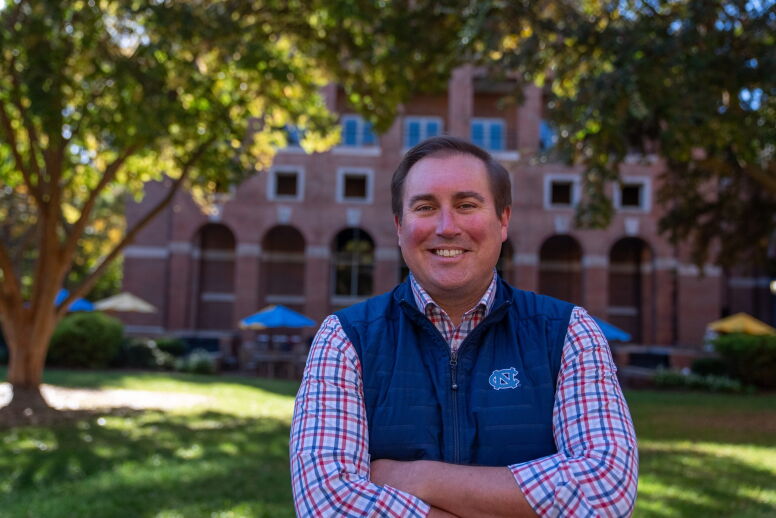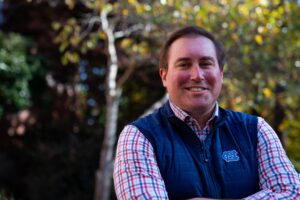News & Stories
Putting mental health first

Imagine achieving your goal: a consulting job that leads to an executive role at a major corporation with the compensation, credentials and accolades that come with success in a fast-paced career.
For Michael Stutts (BSBA ’02) – a self-described “insecure overachiever” – pressure and paranoia accompanied his success. After 15 years as a management consultant and C-suite executive, he was burned out and mentally unhealthy. After he contemplated suicide, he checked into a psychiatric hospital.
Stutts shares his journey in “There’s No Room Service at the Psych Ward: From Boardroom to Breakdown and Back” (Ballast Books, LLC, 2023) with frank honesty and wry humor to shed light on the importance of mental health.
Mental health matters
“There’s nothing fascinating about me, which is why it’s so relevant that we talk about mental health,” he says. “The same way you don’t exercise and eat fatty foods and have a heart attack, you can ignore signals about your mental health and have a ‘brain attack.’ And I had a brain attack.”
In retrospect, Stutts’ realizes his childhood – he developed anxiety and a perceived lack of security – foreshadowed his struggles in adulthood.
When he was about 8, he began to see the world as dangerous and went to school terrified every day. He didn’t sleep. He did poorly in school for a while. And he learned to “push all my anxiety down to the bottom drawer,” a practice he continued into adulthood.
“I have a creative mind. Unfortunately, I can create ideas that are irrational, and I can believe that they’re true and it can affect me in very physical and behavioral ways,” he says.
Back then, he says, “we didn’t talk about mental health. “You know, we just didn’t do that.”

Still he thrived and did all the right things. In 1998 he landed at Carolina and enrolled in the Undergraduate Business Program.
“I’m a third-generation student of UNC Kenan-Flagler,” says Stutts. “I was brought home from the hospital in a UNC onesie, and I was told my whole life that I would be going to UNC. My grandfather went to what was known as the Department of Commerce. My father got his MBA from what is now called UNC Kenan-Flagler.”
He has beautiful memories of being at Carolina, and he benefited from the community he found at Carolina.
“What I appreciated most about UNC Kenan-Flagler was the community created among the students,” he says. “There are some people who say that it’s not good that the School is far away from the rest of campus. I think it’s done right. You can have a great community that’s physically separate with people who have the same kind of ideas in mind but are still a diverse group. You have a lot of shared experiences. That was valuable to me as I went through each stage of my career – having like-minded people around me, but diverse enough in thought that I could get different perspectives.”
Having grown up in Charlotte, he was close enough to family and old friends that he felt connected to his roots. As he set off into the world to launch his career, things began to change.
After graduating, he went into banking in Atlanta. It was a tough market right after the 9/11 terrorist attacks, but he landed a role with SunTrust Banks. Out of 12 new hires in the class, five were UNC Kenan-Flagler graduates.
“The UNC Kenan-Flagler rigor made us stand out,” he says. “Clearly, there was an advantage there.”
After four years at SunTrust, Stutts returned to school, this time to earn his MBA at Northwestern University.
Learning to like yourself
“I was going to be a banker like my dad and granddad, but I discovered I was my own person,” says Stutts. “I have a side of my brain that they didn’t have or pursue, and it’s more of a creative side than a quantitative one, so I pursued management consulting.”
Stutts joined the Boston Consulting Group (BCG) in Dallas and worked there for 10 years, going from intern to managing director and partner. About this time his mental health began to noticeably decline. It’s when he had that brain attack.
“I want to make it very clear. Consulting was not the problem. BCG was not the problem. It was me,” he says.
He left BCG and served as head of technology at Bloomin’ Brands, owners of Outback Steakhouse, in Tampa, Florida.
But Stutts continued to notice red flags about his mental health and grew more paranoid. His life began to unravel.
“I focused only on driving hard to get promoted, get praised,” he says. “I was living a frankly miserable life, and the way I soothed the misery was through generally bad behavior – alcohol, partying, living outside my own set of values. I made a lot of mistakes.”
He decided to “fire himself.”
Getting help
When Stutts contemplated suicide, his mother and sister stepped in. He spent 39 days in a mental institution.
“The best way to describe it is scary, safe and hopeful,” he says. “It’s scary because you lose control of your life. You sign over your guardianship to someone else. You’re behind locked doors. Everything you have is searched. You lose your phone. You lose the outside world, and there’s a scary wall with lasers on top of it. There are other people you don’t know.
“It’s safe because you are safe from yourself and from others and from the outside world. You know that you can’t set any more fires, and that’s a great feeling.
“It’s hopeful because you’re doing a lot of great work on yourself. You’re doing therapy. You’re doing group sessions. You’re also getting to know other people who are not crazy; they’re going through something. You’re not alone.”
Today Stutts is a passionate advocate for addressing mental health in the workplace and life, and hopes his book will help others learn from his mistakes.

Appreciating the fullness of life
His mental health journey put life and work in perspective, and he’s leading a full life.
Professionally, he has continued to pursue his career in a new, healthier way. Stutts has been a chief marketing officer in the cruise industry, an independent corporate consultant and board member for multiple companies. In January 2025, he begins a new role as chief brand officer of Dollar Shave Club as it relocates its headquarters to Durham. He is thrilled to return to his North Carolina roots.
It’s all about moving toward the things that make him happier and therefore more successful. He connects with other people and created a community around himself. He follows his sports teams, including Tar Heels basketball and Panthers football, and attends Bruce Springsteen concerts all over the world. He also stays close with UNC as he serves on the Writing and Learning Center Board.
The message he wants to get out to others is simple and revolves around his three principles:
1. Talk to yourself like you would a friend, especially when you’re facing a difficult time.
2. Remember, for better or worse, no one is thinking about you as much as you’re thinking about yourself – shame and guilt are (mostly) self-imposed emotions
3. When stressed or anxious about a specific event, fast forward to your deathbed: Is this something you’re going to be thinking about in that moment?
Stutts wants people – especially the kinds of “insecure overachievers” who might be at business schools – to be kinder to and gentler with themselves.